Introduction
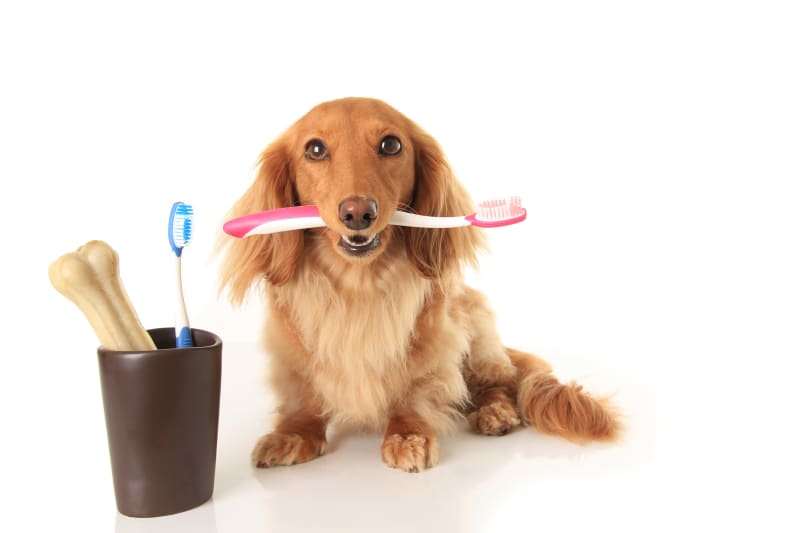
Introduction:
Proper dental care is essential for maintaining the overall health and well-being of our beloved canine companions. Just like humans, dogs can experience a range of dental issues that can cause discomfort, pain, and even lead to more serious health problems if left untreated. In this article, we will explore the importance of dental care for dogs and delve into the benefits of regular brushing and professional cleanings. By understanding the anatomy of a dog's teeth and gums, common dental problems they may face, and the steps involved in brushing their teeth properly, dog owners can take proactive measures to ensure their furry friends have healthy smiles. Let's dive in!
Importance of dental care for dogs

Dental care is a crucial aspect of your dog's overall health and well-being. Neglecting your dog's dental hygiene can lead to various oral health issues, including gum disease, tooth decay, and bad breath. It's important to understand that dogs are susceptible to the same dental problems as humans.
Regular dental care for dogs helps prevent the buildup of plaque and tartar, which can contribute to serious dental conditions. Brushing your dog's teeth regularly and scheduling professional cleanings when necessary can help maintain their oral health. By taking care of your dog's teeth, you are not only preventing painful dental issues but also ensuring their overall health and happiness.
Remember, a healthy mouth means a healthy dog!
Benefits of brushing and professional cleanings

Brushing and professional cleanings are essential for maintaining your dog's dental health. Regular brushing helps remove plaque and tartar buildup, reducing the risk of gum disease and tooth decay. It also helps freshen your dog's breath and prevents bad odors. Additionally, brushing allows you to examine your dog's teeth and gums for any signs of dental problems.
Professional cleanings performed by a veterinarian or a veterinary dental specialist are important because they provide a more thorough cleaning that reaches areas not accessible during home brushing. These cleanings involve scaling to remove stubborn plaque and tartar, polishing to smooth the tooth surface, and in some cases, extractions if necessary.
Both brushing and professional cleanings are crucial in preventing dental issues and maintaining your dog's overall oral health. Regularly incorporating these practices into your dog's routine will greatly benefit their well-being.
Understanding Dental Health in Dogs
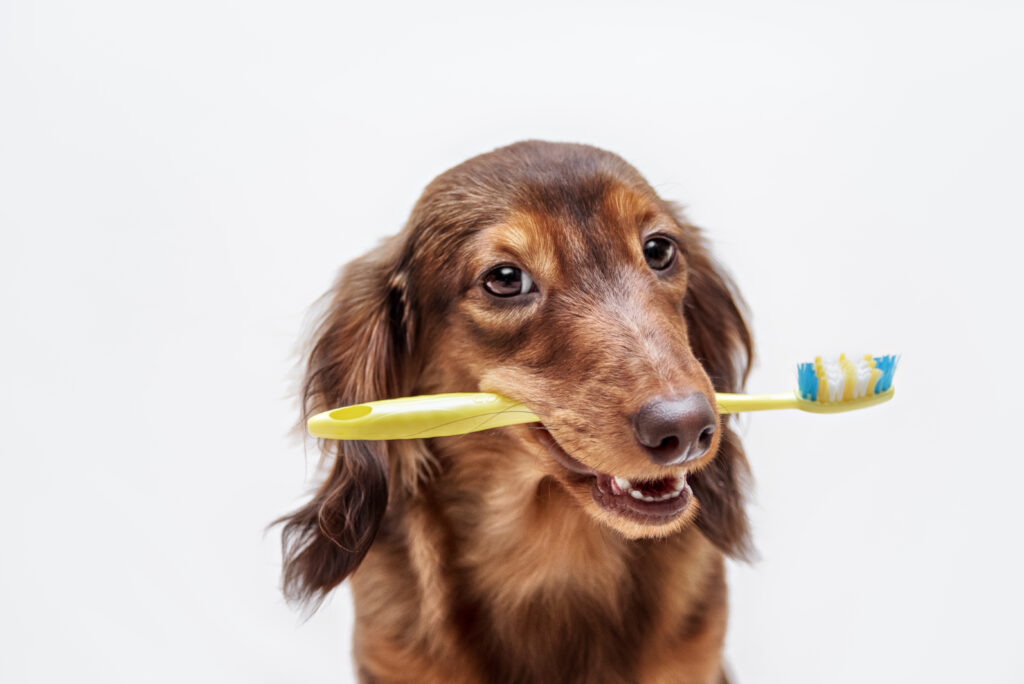
Anatomy of a dog's teeth and gums:
A dog's dental anatomy differs from that of humans. Dogs have a total of 42 teeth, which includes incisors, canines, premolars, and molars. These teeth are designed for specific functions such as grasping, tearing, and grinding food. The gums play an integral role in dental health by protecting the roots of the teeth and supporting their structure.
Common dental problems in dogs:
Just like humans, dogs can also experience dental issues. Some common problems include plaque buildup, tartar formation, gum inflammation (gingivitis), tooth decay (cavities), and periodontal disease. These conditions can lead to bad breath, pain while eating, difficulty chewing food, and even tooth loss if left untreated.
Understanding the basic anatomy of a dog's teeth and being aware of common dental problems is crucial for every dog owner. Regular dental care through brushing and professional cleanings can help prevent these issues and maintain your dog's oral hygiene.
Anatomy of a dog's teeth and gums
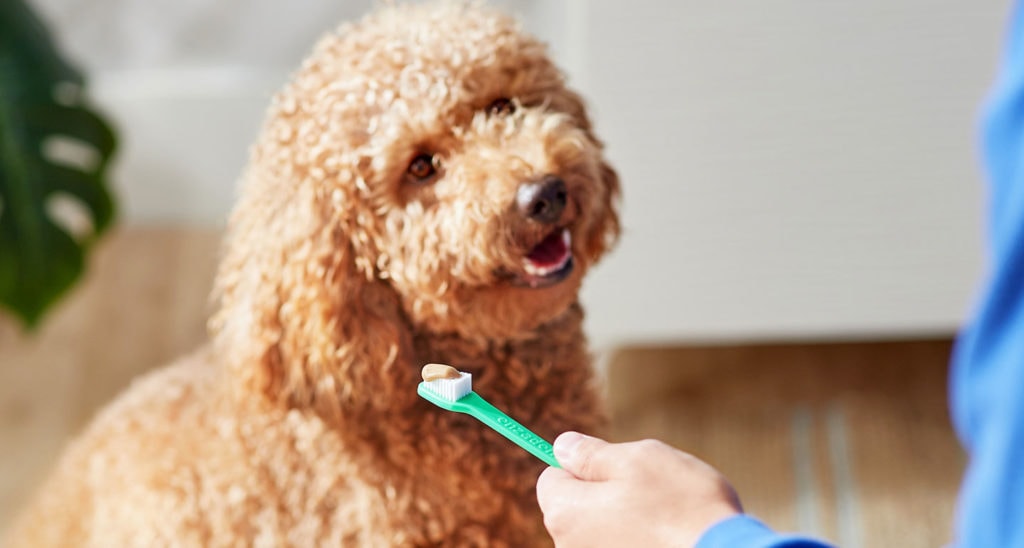
A dog's teeth and gums play a crucial role in their overall health and well-being. Dogs typically have 42 teeth, which include incisors, canines, premolars, and molars. Incisors are at the front of the mouth and used for nibbling and grooming. Canines are sharp and are used for tearing food. Premolars and molars are located at the back of the mouth and are responsible for grinding food.
The gums, also known as gingiva, surround the teeth, providing support and protection. Healthy gums should be pink in color with no signs of swelling or inflammation.
Understanding the anatomy of a dog's teeth and gums is essential in detecting dental issues early on. Regular check-ups with a veterinarian can help ensure that your dog maintains optimal dental health.
Common dental problems in dogs
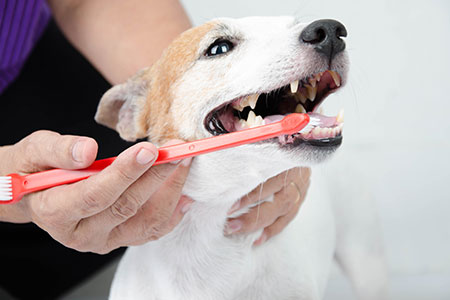
Dogs can experience a range of dental problems that can affect their overall health and well-being. One common dental issue in dogs is periodontal disease, which refers to inflammation and infection of the gums and surrounding structures. This can lead to symptoms such as bad breath, bleeding gums, and tooth loss. Another common problem is dental plaque and tartar buildup, which can lead to tooth decay and gum disease if left untreated. Additionally, dogs may also suffer from fractured or broken teeth due to trauma or chewing on hard objects. It's important for dog owners to be aware of these common dental problems and take proactive steps to prevent them through regular brushing and professional cleanings.
Why Brushing is Essential
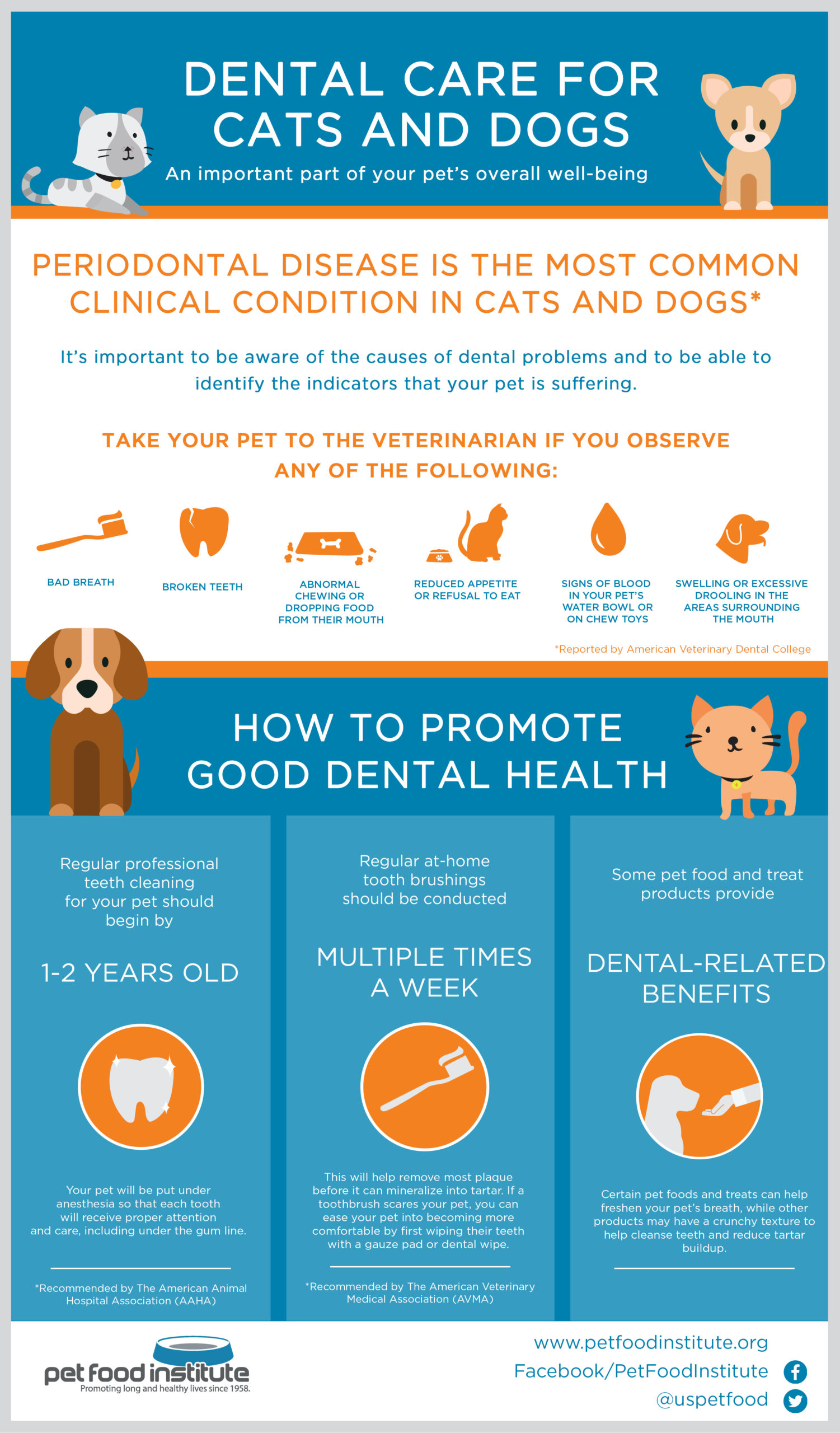
Brushing your dog's teeth is essential for maintaining their overall oral health. Regular brushing helps to prevent the buildup of plaque and tartar, which can lead to dental diseases such as gum inflammation, tooth decay, and tooth loss.
By brushing your dog's teeth, you are also able to inspect their mouth for any signs of dental issues or abnormalities. This allows for early detection and treatment, preventing further complications down the line.
Additionally, regular brushing helps freshen your dog's breath and promotes good oral hygiene. It gives you the opportunity to remove any food particles or debris stuck between their teeth and gums.
To ensure effective brushing, it is important to choose the right toothbrush and toothpaste specifically formulated for dogs. Brushing your dog's teeth should be a gentle and positive experience, done in a calm and comfortable environment.
By making brushing a part of your dog's routine, you are taking proactive steps towards ensuring their dental health and overall well-being.
Benefits of regular brushing

Regular brushing is crucial for maintaining optimal dental health in dogs. By incorporating this simple habit into your pet's routine, you can enjoy numerous benefits. Firstly, brushing helps prevent the buildup of plaque and tartar on your dog's teeth, reducing the risk of gum disease and tooth decay. Secondly, it promotes fresh breath, ensuring your furry friend has pleasant-smelling breath during cuddle sessions. Furthermore, regular brushing stimulates the gums, leading to improved blood circulation and overall oral health. Additionally, by regularly inspecting your dog's mouth during brushing sessions, you can identify any potential dental issues early on, allowing for prompt treatment. Ultimately, the benefits of regular brushing extend beyond a shiny smile and contribute to your dog's overall well-being.
Choosing the right toothbrush and toothpaste for your dog
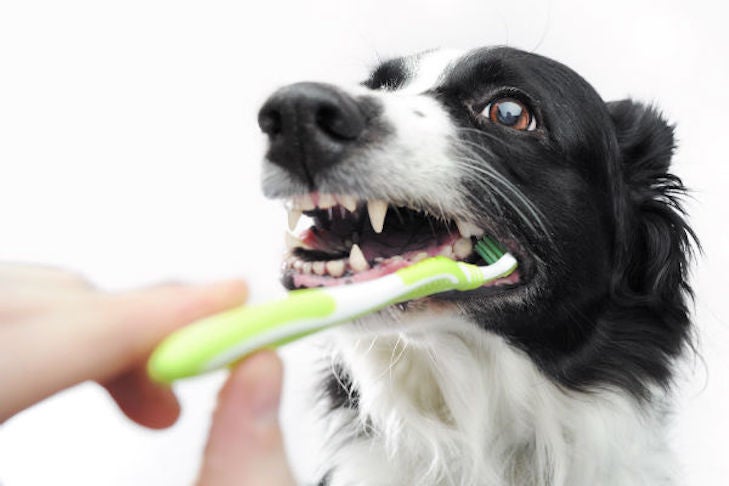
To ensure effective brushing, it is important to choose the right toothbrush and toothpaste for your dog. When it comes to toothbrushes, opt for ones that are specifically designed for dogs. These brushes will have soft bristles and a longer handle, making it easier to reach all areas of your dog's mouth. Avoid using human toothbrushes as they may be too hard and uncomfortable for your furry friend.
When it comes to toothpaste, never use human toothpaste as it contains ingredients that can be toxic to dogs when ingested. Instead, look for a toothpaste formulated specifically for dogs. These toothpastes come in flavors that dogs find appealing, making the brushing experience more enjoyable for them. It is best to consult with your veterinarian to find the most suitable toothbrush and toothpaste for your dog's specific needs.
Step-by-Step Guide to Brushing Your Dog's Teeth
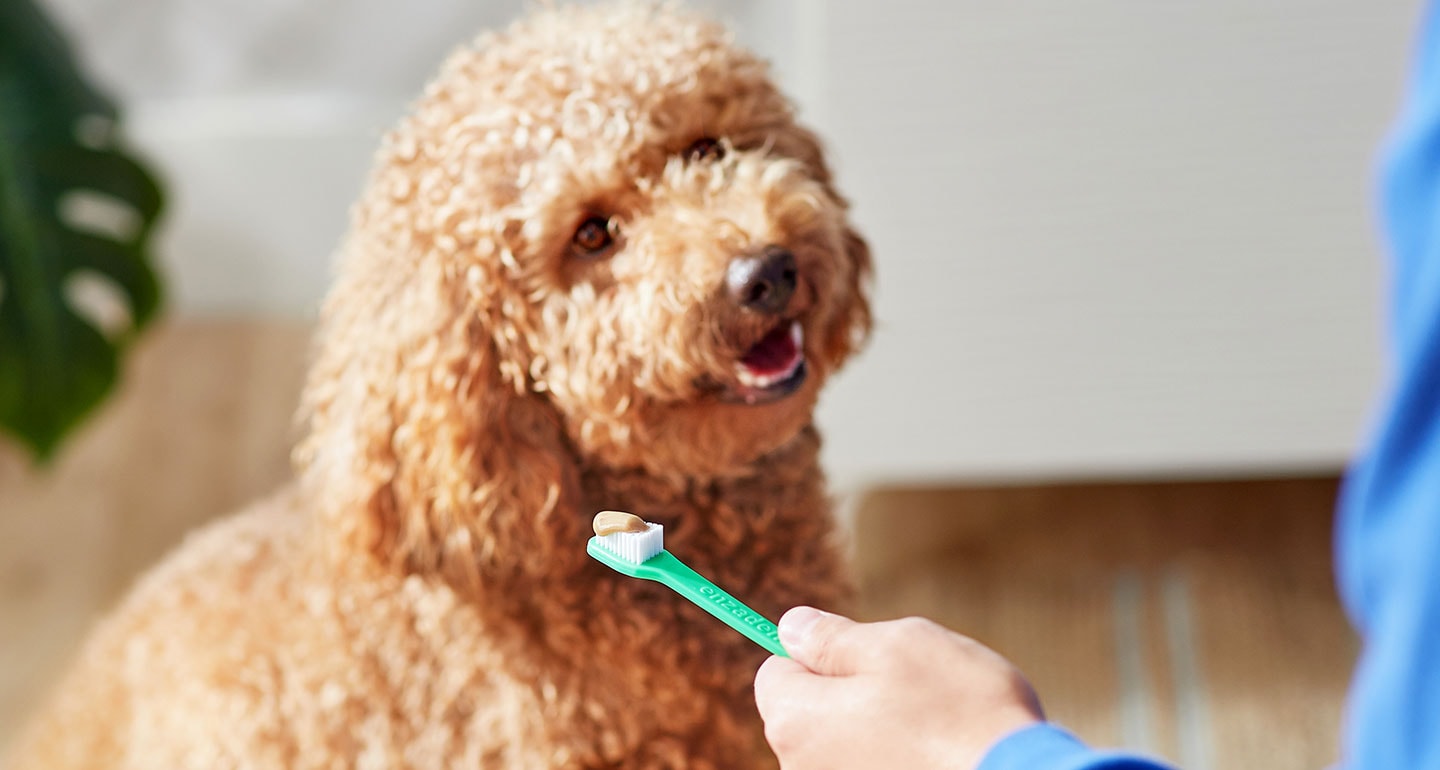
Step-by-Step Guide to Brushing Your Dog's Teeth:
- Start by introducing your dog to the toothbrush and toothpaste slowly, allowing them to sniff and taste them.
- Use a specially designed dog toothbrush or a finger brush that fits over your finger for better control.
- Apply a pea-sized amount of dog-friendly toothpaste onto the brush. Never use human toothpaste as it can be harmful to dogs.
- Gently lift your dog's lip and begin brushing in small, circular motions along the gum line.
- Focus on the outer surfaces of the teeth, as this is where plaque and tartar tend to accumulate.
- Gradually increase the brushing time over several sessions until you can brush all of your dog's teeth.
- Provide positive reinforcement with praises and treats after each successful brushing session.
- Aim for daily brushing but at least 2-3 times a week for optimal dental hygiene.
Remember, patience and consistency are key when it comes to brushing your dog's teeth. By following this step-by-step guide, you can help maintain your dog's oral health and prevent dental problems in the future.
Preparing your dog for brushing
:max_bytes(150000):strip_icc()/hand-brushing-dog-teeth-in-bathroom-2000-ad97a8f70c634ab5a3e6815eef15e512.jpg)
Preparing your dog for brushing is an essential step to ensure a successful dental care routine. Begin by introducing your dog to the toothbrush and toothpaste gradually, allowing them to sniff and explore these items. It is important to choose a toothbrush specifically designed for dogs, as human toothbrushes may be too harsh for their gums. Prior to brushing, spend some time massaging your dog's gums with your finger to get them comfortable with the sensation. Additionally, make sure that both you and your dog are in a calm and relaxed environment before starting the brushing session. By taking these steps, you can help alleviate any anxiety or resistance and make the brushing experience a positive one for your dog.
Proper brushing techniques and tips

Proper brushing techniques and tips are crucial for maintaining your dog's dental health. Here are some important guidelines to follow:
- Start slowly: Begin by introducing your dog to the toothbrush and toothpaste gradually. Allow them to sniff and taste the toothpaste before attempting to brush.
- Use a soft-bristled brush: Opt for a toothbrush specifically designed for dogs. The soft bristles are gentle on their gums and teeth.
- Brush in circular motions: Angle the brush at a 45-degree angle and gently brush in circular motions. Pay attention to both the front and back teeth.
- Be patient and gentle: Take your time during brushing sessions and be gentle with your movements. This will help your dog feel more comfortable and cooperative.
- Reward good behavior: After each successful brushing session, reward your dog with praise or a small treat. Positive reinforcement creates a positive association with brushing.
Remember, consistency is key when it comes to brushing your dog's teeth. Aim for daily brushing, but even a few times per week can make a significant difference in maintaining their oral hygiene.
Professional Dental Cleanings for Dogs

When it comes to maintaining your dog's dental health, regular brushing is essential. However, there may be instances where professional dental cleanings are necessary. These cleanings are performed by veterinarians and involve a thorough examination of your dog's teeth and gums.
Professional cleanings allow for a deep cleaning of your dog's teeth, removing any tartar buildup or plaque that may have accumulated over time. This is done using specialized dental instruments and techniques that can reach areas that may be difficult to clean with brushing alone.
During a professional cleaning, your dog will be placed under anesthesia to ensure their comfort and safety throughout the procedure. This also allows the veterinarian to properly examine the mouth and perform any necessary treatments, such as tooth extractions or gum disease treatment.
It is important to note that professional cleanings should be done under the guidance of a veterinarian. Your vet will assess your dog's individual needs and recommend the appropriate frequency for cleanings based on their oral health.
By incorporating regular brushing and professional dental cleanings into your dog's routine, you can help prevent dental problems and ensure their overall well-being.
When to consider professional cleanings
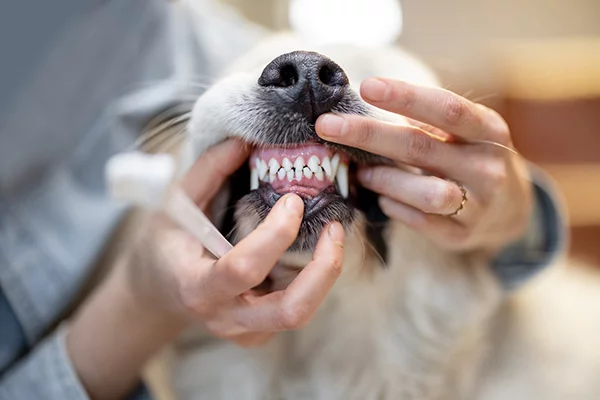
When to consider professional cleanings:
Professional dental cleanings for dogs are typically recommended by veterinarians when there is a significant buildup of plaque and tartar on the teeth. This can occur even with regular brushing, as some areas may be difficult to reach. Additionally, if your dog already has existing dental problems such as periodontal disease or tooth decay, professional cleanings may be necessary to remove the bacteria and restore oral health.
It is important to schedule a professional cleaning if you notice signs of dental issues in your dog, such as bad breath, swollen or bleeding gums, excessive drooling, difficulty eating, or loose teeth. Your veterinarian will assess your dog's dental health and recommend the appropriate timing for professional cleanings based on their individual needs.
Regular check-ups and discussions with your veterinarian can help you determine when it is necessary to schedule a professional dental cleaning for your beloved furry friend.
What to expect during a dental cleaning procedure

During a dental cleaning procedure for dogs, there are several important steps to expect. First, the veterinarian will conduct a thorough examination of your dog's teeth and gums to assess the level of tartar buildup and any other potential dental issues. Then, your dog will be placed under anesthesia to ensure their comfort and safety throughout the procedure.
Next, the veterinarian will use specialized dental tools to remove the tartar and plaque from your dog's teeth. They will also clean below the gumline to eliminate any hidden bacteria. In some cases, dental x-rays may also be taken to check for any underlying issues.
Once the cleaning is complete, the veterinarian may polish your dog's teeth to smooth out any rough surfaces, making it more difficult for plaque to adhere in the future. Finally, they may provide recommendations for at-home oral care products or schedule follow-up visits if needed.
It's important to follow any post-procedure instructions provided by your veterinarian and maintain regular dental check-ups to ensure ongoing dental health for your dog.
Preventive dental care products

Preventive dental care products play a crucial role in maintaining the oral health of dogs. Dental chews and toys are highly recommended as they help reduce plaque and tartar buildup. These products are designed to promote chewing and help remove debris from the teeth. Look for options that have a rough texture to provide effective cleaning.
In addition to dental chews, there are also water additives and oral sprays available that can aid in maintaining dental health. These products contain ingredients that help fight bacteria, freshen breath, and reduce plaque formation.
It is important to note that while these preventive products can be beneficial, they should not replace regular brushing or professional dental cleanings. Incorporating a combination of preventive care products, brushing, and professional cleanings into your dog's dental routine is the best way to ensure optimal oral health.
Dental chews and toys for dogs

Dental chews and toys can be a valuable addition to your dog's oral hygiene routine. These products are specifically designed to promote dental health by helping reduce plaque and tartar buildup.
Dental chews are typically made from a textured material that helps to remove debris and massage the gums during chewing. They can also serve as a form of entertainment and mental stimulation for your dog. Look for chews that are specifically labeled as promoting dental health, and ensure they are an appropriate size for your dog.
Similarly, dental toys can provide a means for your dog to clean their teeth while playing. These toys often have ridges or grooves that help to scrape away plaque. Additionally, some dental toys are infused with ingredients that aid in freshening breath and preventing bacterial growth.
When choosing dental chews and toys for your dog, it's important to select high-quality, durable products that are suitable for their size and chewing style. Consult with your veterinarian for recommendations on which specific brands or types of dental chews and toys would be most beneficial for your furry friend.
Remember, while dental chews and toys can supplement regular brushing and professional cleanings, they should not replace these essential components of maintaining optimal dental health in dogs.
Water additives and oral sprays for dental health

Water additives and oral sprays are additional tools you can use to improve your dog's dental health. These products work by promoting oral hygiene and reducing plaque and tartar buildup. Water additives are mixed with your dog's drinking water, which helps to prevent bacteria growth and freshen their breath. They often contain ingredients like enzymes or antimicrobial agents to target dental issues.
Oral sprays, on the other hand, are applied directly to your dog's gums and teeth. They help to control bacteria, reduce inflammation, and freshen the breath. These sprays can be a convenient option for dogs who are not comfortable with brushing.
When using water additives or oral sprays, it's essential to follow the manufacturer's instructions for proper dosage and application. Remember that these products should not replace regular brushing or professional cleanings but can complement them as part of a comprehensive dental care routine for your furry friend.
Importance of Regular Check-ups and Dental Exams
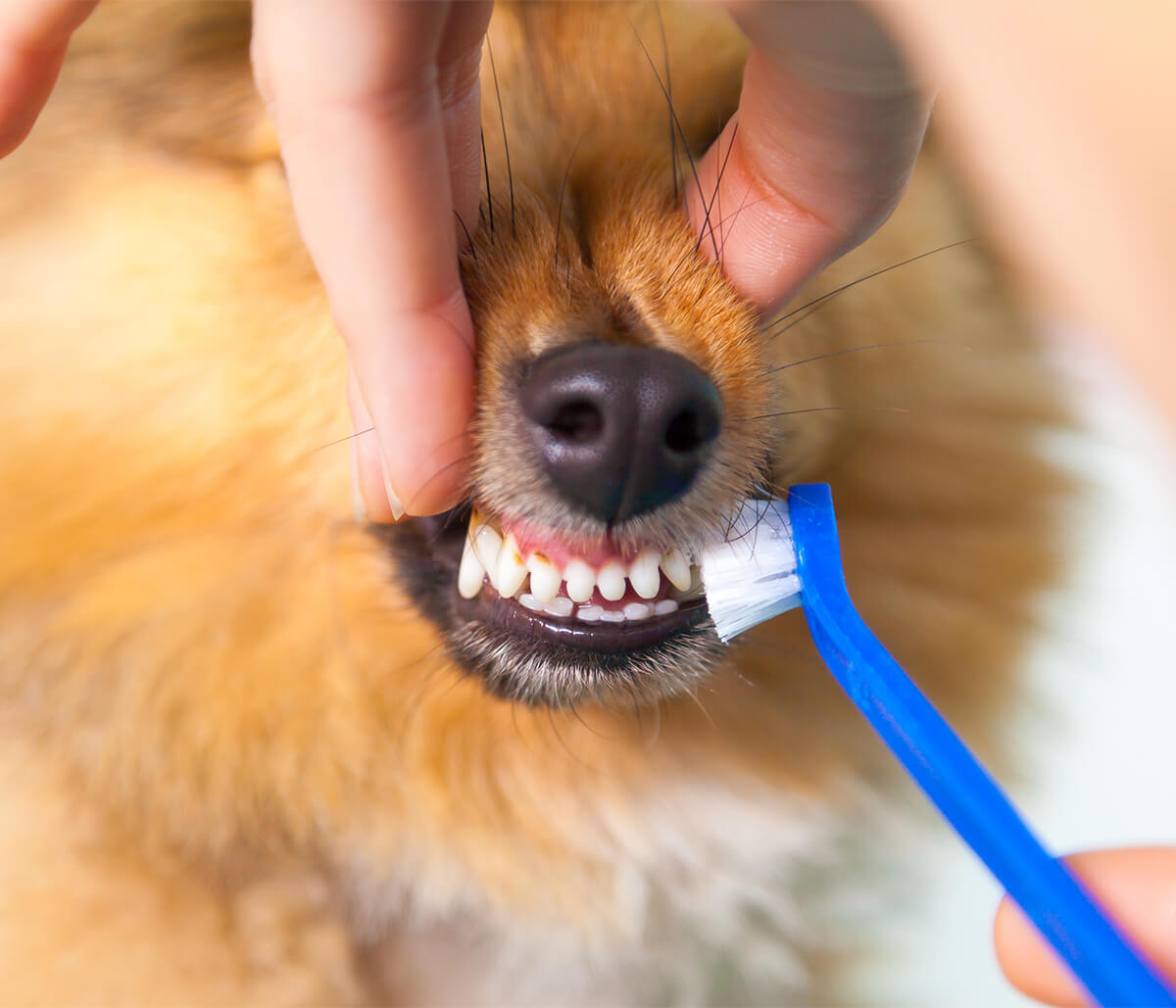
Regular check-ups and dental exams play a crucial role in maintaining the overall oral health of dogs. These routine visits allow veterinarians to assess the condition of a dog's teeth and gums, identify any potential issues, and provide necessary care. By scheduling regular check-ups, owners can stay proactive and identify dental problems early on, preventing them from worsening and causing pain or discomfort to their furry companions.
During dental exams, veterinarians examine the dog's teeth, gums, and oral cavity for signs of periodontal disease, tooth decay, or other oral issues. They can recommend appropriate treatments or procedures based on their findings.
In addition to professional cleanings, regular check-ups ensure that dogs receive appropriate preventive care to maintain good oral hygiene. Ultimately, these proactive measures help ensure that dogs are protected from potential dental problems and enjoy a healthy mouth throughout their lives.
The role of routine examinations in maintaining dental health

Routine examinations play a crucial role in maintaining the dental health of your beloved furry friend. These regular check-ups allow veterinarians to assess the overall oral hygiene of your dog, identify any underlying issues, and take preventive measures to ensure optimal dental health.
During these examinations, the veterinarian will conduct a thorough examination of your dog's teeth and gums. They may perform a dental cleaning to remove plaque and tartar buildup, as well as evaluate the condition of the teeth for signs of decay or infection.
By regularly scheduling dental exams for your dog, you can catch any potential problems early on, preventing them from progressing into more serious conditions. Additionally, these exams provide an opportunity for the veterinarian to offer guidance on effective home care routines and recommend appropriate dental products.
Remember, prevention is always better than cure when it comes to your dog's oral health. So make sure to prioritize routine dental examinations to keep your furry friend's smile bright and healthy.
Identifying dental issues early on

It is crucial to identify dental issues early on in your dog to prevent them from progressing into more serious problems. Regularly examining your dog's mouth can help you spot any signs of dental issues. Look for red or swollen gums, bad breath, broken or loose teeth, abnormal drooling, and difficulty eating or chewing. Additionally, pay attention to any changes in your dog's behavior such as increased irritability or reluctance to eat hard food. If you notice any of these signs, it is important to schedule a dental exam with your veterinarian. Early detection allows for prompt treatment and prevents further discomfort and potential complications for your furry friend.
Common Misconceptions about Dog Dental Care

Debunking common myths about brushing and cleanings
- "Dogs don't need their teeth brushed."
Contrary to popular belief, dogs do require regular dental care, including brushing. Just like humans, dogs are susceptible to plaque and tartar buildup, which can lead to gum disease and tooth loss if left untreated. Brushing your dog's teeth on a regular basis helps remove plaque and prevent dental issues.
- "Professional cleanings are unnecessary."
While brushing at home is crucial, it's important to understand that professional dental cleanings complement regular brushing. Professional cleanings performed by a veterinarian involve a thorough examination of the teeth and gums, removal of tartar buildup, and addressing any underlying dental issues that may go unnoticed.
By debunking these misconceptions and seeking proper dental care for your furry friend, you can ensure their overall health and well-being for years to come.
Debunking common myths about brushing and cleanings
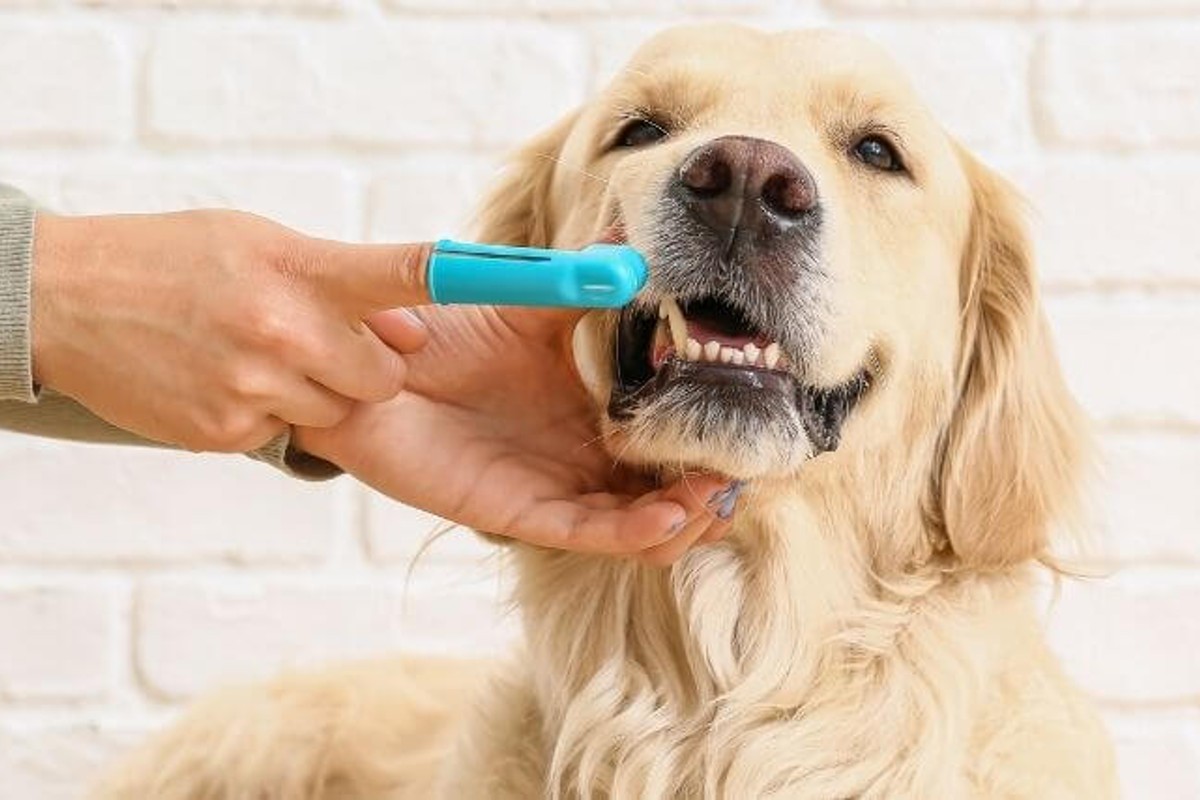
Myth #1: Brushing is Optional
Many dog owners believe that brushing their dog's teeth is optional or unnecessary. However, this couldn't be further from the truth. Brushing is an essential part of maintaining your dog's dental health. Regular brushing helps remove plaque and prevent the buildup of tartar, which can lead to dental issues such as gum disease and tooth loss.
Myth #2: Professional Cleanings are Harmful
Some people worry that professional cleanings for dogs require anesthesia and pose a risk to their pets' health. While anesthesia is used during these procedures to ensure the dog remains still and comfortable, it is administered by skilled professionals and is generally safe for dogs. Professional cleanings are necessary to thoroughly clean below the gum line, remove tartar, and address any underlying dental issues.
By debunking these common myths about brushing and cleanings, dog owners can understand the importance of dental care in their furry friend's overall well-being. With consistent dental care routine and regular check-ups, you can safeguard your dog's oral health and potentially prevent more significant problems down the road.
Addressing concerns about anesthesia during dental procedures

It is common for pet owners to have concerns about anesthesia during dental procedures for dogs. However, it is important to understand that the use of anesthesia is necessary to ensure the safety and effectiveness of the dental cleaning or any other dental treatment.
Anesthesia allows veterinarians to perform a thorough examination of your dog's teeth and gums, remove plaque and tartar, and address any underlying dental issues. It keeps your dog still and comfortable while allowing the veterinarian to work efficiently.
Modern veterinary anesthetics are safe and have been designed specifically for animals, taking into account their size, age, and overall health. Prior to the procedure, your veterinarian will perform a comprehensive physical examination and run blood tests to ensure that your dog is healthy enough for anesthesia.
During the procedure, your dog will be closely monitored by trained professionals who will continuously assess their heart rate, blood pressure, oxygen levels, and temperature. This ensures that any potential complications can be identified and addressed immediately.
While there are always risks associated with anesthesia, these risks are minimized through proper screening of patients, vigilant monitoring during the procedure, and utilizing advanced anesthetic techniques. Rest assured that the benefits of a thorough dental cleaning far outweigh the potential risks associated with anesthesia.
If you have concerns about anesthesia or any aspect of your dog's dental care, it is best to consult with your veterinarian. They can address your specific concerns based on your dog's individual needs and provide you with peace of mind regarding their dental health.
Conclusion
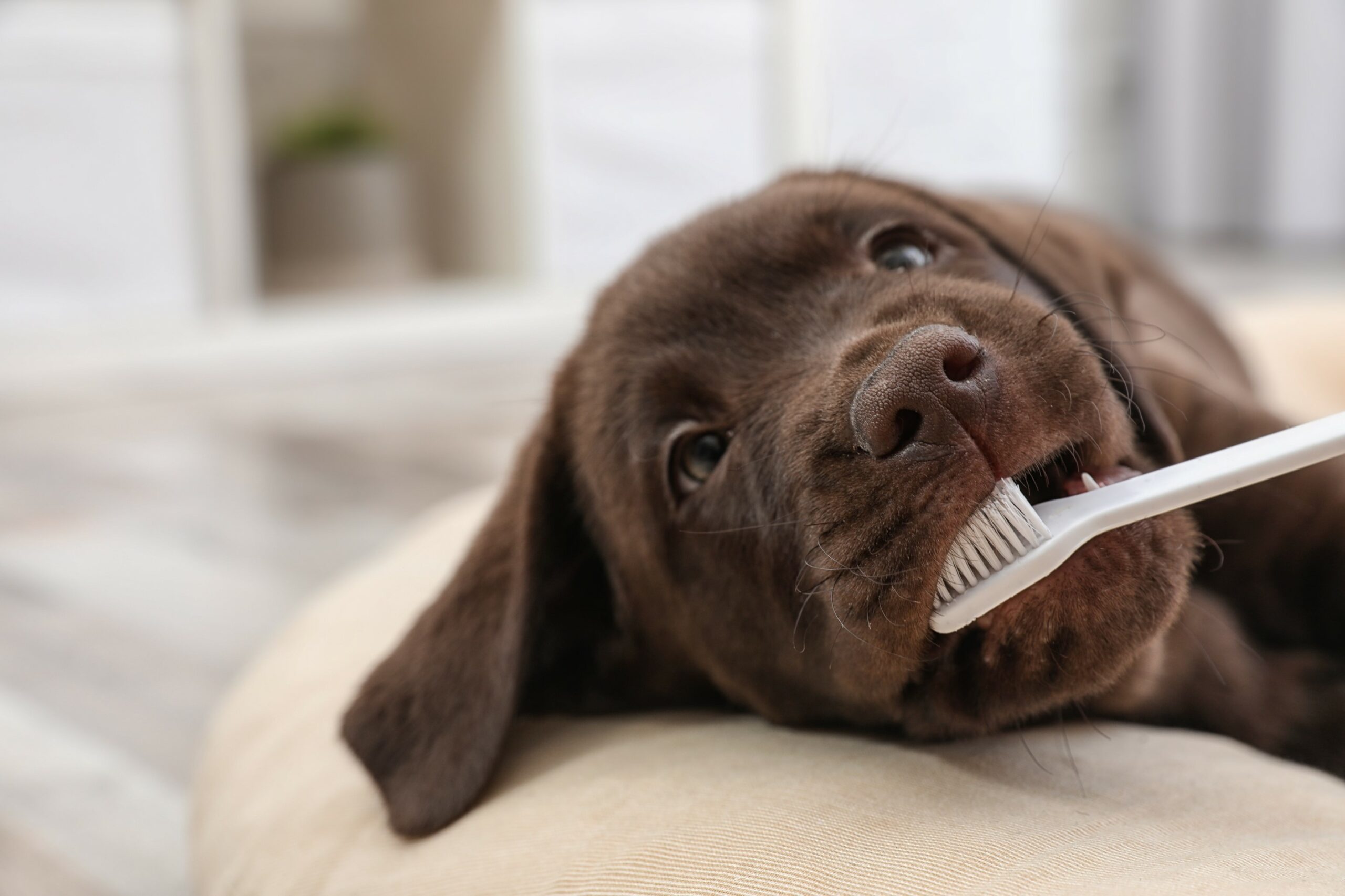
In conclusion, dental care is crucial for the overall health and well-being of dogs. Regular brushing and professional cleanings are essential in maintaining their oral hygiene and preventing dental problems. By understanding the anatomy of a dog's teeth and gums, as well as common dental issues, owners can take proactive measures to ensure their furry friends have healthy smiles.
Regular brushing offers numerous benefits, such as preventing plaque buildup, reducing bad breath, and lowering the risk of gum disease. Selecting the right toothbrush and toothpaste designed for dogs is important for effective cleaning.
For more thorough cleanings, professional dental cleanings may be necessary. These procedures involve scaling, polishing, and sometimes extractions under anesthesia to provide a deep clean.
Incorporating preventive dental care products like dental chews, toys, water additives, and oral sprays can further enhance a dog's oral health.
Routine check-ups and dental exams play a significant role in identifying any potential issues early on and addressing them promptly.
It's important to debunk common misconceptions about dog dental care, such as concerns about anesthesia during procedures. Dental care can be safely performed with proper protocol in place.
To maintain your dog's oral hygiene, it is recommended to make dental care a routine part of their daily grooming regimen. Consulting with a veterinarian or veterinary dentist will provide expert advice on specific needs for your dog's oral health.
By prioritizing dental care for dogs through regular brushing, professional cleanings when needed, and routine check-ups with your veterinarian, you can ensure that your beloved pet has a healthy and happy smile for years to come.
Steps to incorporate dental care into your dog's routine
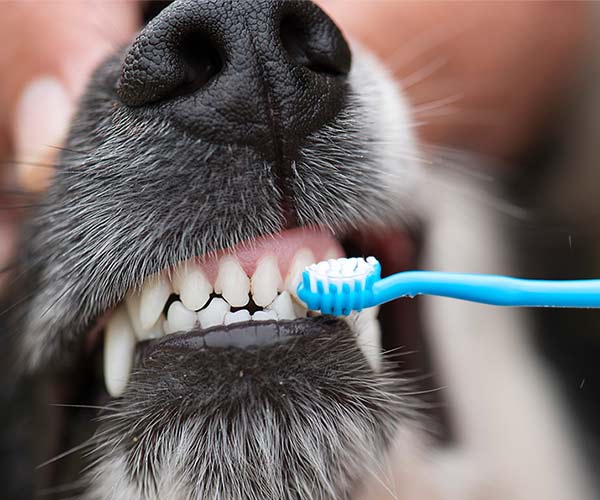
To incorporate dental care into your dog's routine, there are a few simple steps you can follow. Firstly, make it a habit to brush your dog's teeth regularly. Start by introducing them to the toothbrush and toothpaste gradually, using positive reinforcement to make it a positive experience. Brushing should be done at least two to three times a week for optimal oral hygiene.
In addition to brushing, provide your dog with dental chews or toys specifically designed to promote dental health. These products can help reduce plaque and tartar buildup while also providing entertainment for your pup.
Finally, schedule regular check-ups with your veterinarian to monitor your dog's oral health and catch any potential issues early on. By incorporating these steps into your dog's routine, you can ensure they maintain good dental hygiene and overall health throughout their life.
Expert advice on maintaining your dog's oral hygiene

To maintain your dog's oral hygiene, it's important to follow expert advice. First and foremost, regular brushing is crucial. According to experts, brushing your dog's teeth at least three times a week is ideal. Use a toothbrush and toothpaste specifically formulated for dogs. Secondly, consider incorporating dental chews and toys into your dog's routine. These products can help reduce plaque buildup and prevent dental issues. Additionally, experts recommend using water additives and oral sprays that promote dental health in dogs. Lastly, make sure to schedule regular check-ups and dental exams with a veterinarian. These visits are crucial for identifying any potential dental problems early on. By following these expert recommendations, you can ensure that your dog maintains good oral hygiene and overall health.




0 Comments